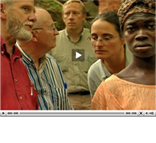

2008-2009 Community Engagement Partners
We have continued to work with countless good folks at a whole range of institutions (in the U.S. and overseas) over the years since the film was released – people who have organized screenings/dialogues, workshops, trainings, presentations, panels, etc. You can see a list here.
Our primary partners in the first two years of the film’s release were:
POV: We are especially grateful to POV for broadcasting the documentary on PBS stations nationwide in June 2008 as their season launch. The broadcast reached over 1.4 million viewers, and led to an Emmy nomination for ressarch. In addition to broadcast, POV’s fabulous team provided extensive outreach and press work which multiplied our impact exponentially. They also worked with us to create companion guides to the film and created a website about the film, with a host of additional resources, which you can access here.
One of our primary partnerships in 2009 was with the Fetzer Institute and their Campaign on Love and Forgiveness. We were honored to be their featured film for the end of 2008 and first half of 2009. The campaign is a partnership with six public television stations that each work with community partners to hold screenings and dialogues on topics, such as ours, that are connected to love and forgiveness.
Rhode Island for Community and Justice (RICJ) was the lead organizer of screenings and dialogues of Traces of the Trade in Rhode Island around the time of the film´s release. RICJ is a social justice organization dedicated to fighting bias, bigotry and racism and promoting understanding and respect among all races, religions and cultures through advocacy, conflict resolution and education.
In 2008-2009, the Massachusetts Foundation for the Humanities commemorated the 200th anniversary of the abolition of the slave trade with public programs around the state, pairing Traces of the Trade with archival and other historical materials to stimulate discussion about the centrality of the business of slavery to the Massachusetts economy in the period between the Revolutionary and Civil Wars. The program was funded, in part, by a “We the People” grant from the National Endowment for the Humanities.
We partnered with the Unitarian Universalist Association and the UU organization Allies for Racial Equity on the development and dissemination of companion materials for Unitarian congregations, in support of the truth and reconciliation responsive resolution that passed at General Assembly in June 2007.
Sponsorship
Traces of the Trade was produced in association with WGBH-Boston, where the team was based as Filmmakers-in-Residence during part of post-production.
Fiscal sponsorship was provided by the Film Arts Foundation, the San Francisco Film Society, the Rhode Island Council for the Humanities, and the Arts and Cultural Alliance of Newport County.
Gracious support was also provided by the Episcopal Divinity School.
Funders
We are grateful to our many financial contributors, without whom we could not have made this film:
- Akonadi Foundation
- Animating Democracy Initiative (a project of Americans for the Arts, funded by the Ford Foundation)
- Butler Family Fund
- Annie E. Casey Foundation
- Coolidge Family Fund, Boston Foundation
- Nathan Cummings Foundation
- Dainger Fund, Boston Foundation
- Episcopal Church, Social Justice Office (and several Dioceses and organizations/offices)
- Fetzer Institute
- Ford Foundation
- Independent Television Service
- Kealy Family Foundation
- Lear Family Foundation
- LEF Foundation
- Massachusetts Foundation for the Humanities
- National Endowment for the Humanities
- Philadelphia Foundation
- Prince Charitable Trusts
- Rhode Island Council for the Humanities
- Rhode Island Foundation
- Sundance Institute Documentary Fund
- Three Dog Farm Foundation
- Threshold Foundation
- Trinity Grants Program
- Unitarian Universalist Funding Program
- Archie D. & Bertha H. Walker Foundation
- Wyncote Foundation
- And many individual donors to whom we are also so grateful
